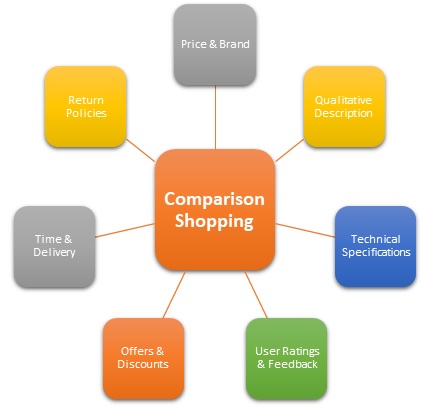Consumers Rarely Compare Shopping Products Before Purchasing Them

A Comparative Analysis Between Online And Offline Channels Where So, let’s take a look at how consumers compare prices to make purchase decisions. 1. the traditional way. this is the traditional way of comparing products, and many consumers still make use of. Study with quizlet and memorize flashcards containing terms like when buying unsought products, consumers spend considerable time and effort in gathering information and making comparisons. t f, service variability means that the quality of services does not depend on who provides them. t f, zappos recognizes the importance of the buyer seller interaction. they only hire people with an innate.

Comparison Shopping Meaning Importance Example Marketing In this comprehensive article, we will explore the various types of consumer goods, including convenience goods, shopping goods, specialty goods, and unsought goods. 1. convenience goods. Shock to loyalty. 3. consumers are switching brands at unprecedented rates. the crisis has prompted a surge of new activities, with an astonishing 75 percent of us consumers trying a new shopping behavior in response to economic pressures, store closings, and changing priorities. this general change in behavior has also been reflected in a. It empowers consumers to make informed decisions based on thorough research and comparisons. by utilizing this practice, individuals can save money, ensure product quality, enjoy a wide variety of options, and feel confident in their purchases. comparison shopping promotes efficient use of time, consumer advocacy, avoidance of impulse buys, and. And 78% said that they like to compare prices from different stores or sources before making purchases.more specifically, 17% said that they always compare prices from one or more stores or businesses before completing purchases. 41% said they compare prices most of the time before purchasing. 28% do so about half the time. 10% rarely ever.

3 Reasons Consumers Should Compare Prices Before Purchasing It empowers consumers to make informed decisions based on thorough research and comparisons. by utilizing this practice, individuals can save money, ensure product quality, enjoy a wide variety of options, and feel confident in their purchases. comparison shopping promotes efficient use of time, consumer advocacy, avoidance of impulse buys, and. And 78% said that they like to compare prices from different stores or sources before making purchases.more specifically, 17% said that they always compare prices from one or more stores or businesses before completing purchases. 41% said they compare prices most of the time before purchasing. 28% do so about half the time. 10% rarely ever. In her research, manissa primarily investigates how different forms of numerical information influence consumers’ judgments, decision making, and behavior. whether on retailers’ own platforms. Consumer shopping preferences. to get a better understanding of how price impacts shoppers’ decisions to buy, we first asked our consumers if they prefer to buy directly from a brand or from a third party seller for a lower price. seventy eight percent of respondents stated that they’d rather buy an item from a third party seller for less.

Comments are closed.